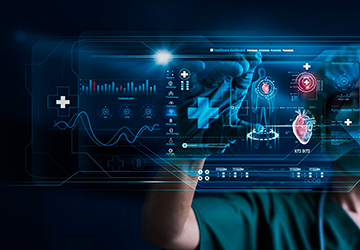The realm of personalized medicine heralds a transformative era in healthcare. Advanced technological applications enable clinicians to formulate individualized treatment protocols. This nuanced approach amplifies therapeutic effectiveness and mitigates potential adverse effects, thus optimizing patient health outcomes.

Technology in personalized medicine is instrumental in the precise diagnosis and management of diseases. Breakthroughs such as genomic sequencing and sophisticated bioinformatics empower physicians to decipher their patients' intricate genetic underpinnings. This granular insight facilitates the development of treatment regimens meticulously aligned with each individual's genetic predispositions.
● Genomic Sequencing: Unraveling and interpreting the genetic codes that dictate disease manifestations.
● Bioinformatics: Leveraging complex computational tools to analyze intricate biological data.
● Predictive Analytics: Utilizing advanced algorithms to anticipate health trajectories and treatment responses.
These technological pillars are crucial in formulating custom healthcare solutions that respect individuals' unique genetic profiles, lifestyles, and medical histories.
Custom healthcare solutions are foundational to the ethos of personalized medicine. These tailored strategies significantly elevate patient care by addressing the unique health characteristics of individuals. Salient advantages include:
● Augmented Therapeutic Efficacy: Treatments tailored to specific genetic configurations exhibit heightened effectiveness.
● Diminished Adverse Reactions: Personalized therapeutic approaches inherently reduce the likelihood of undesirable side effects.
● Optimized Medical Resource Utilization: Tailored health plans often prevent the need for redundant testing and procedures, enhancing medical resource efficiency.
Integrating comprehensive health analytics with cutting-edge technology furnishes custom healthcare solutions with a level of sophistication that traditional approaches cannot rival.
The future of personalized healthcare is characterized by a profound integration of technology into the fabric of medical care. Innovations such as artificial intelligence in diagnostics expanded telehealth capabilities, and intelligent wearable technology are ushering in a transformative era in healthcare delivery.
● AI and Machine Learning: These avant-garde technologies refine diagnostic precision and accurately predict health outcomes.
● Telemedicine: Enhancing healthcare accessibility and convenience, extending personalized medicine's reach.
● Smart Wearables: Devices that provide continuous health monitoring, offering real-time insights into an individual's health dynamics.
These technological advancements signify a paradigm shift towards more proactive and preventative healthcare management, underscoring the indispensable role of technology in personalized medicine.
The adoption of technology in personalized medicine involves several formidable challenges:
● Data Privacy and Security: Paramount importance is placed on safeguarding confidential health information.
● Inclusivity in Healthcare: It is critical to ensure that custom healthcare solutions are equitably accessible across different demographics.
● Regulatory Adherence: Navigating the intricate legal frameworks that govern medical data and technology applications.
Addressing these concerns is critical for the ethical advancement of personalized healthcare solutions.
At the vanguard of precision medical treatments, personalized genomics and pharmacogenomics deliver unmatched accuracy in patient care. These fields scrutinize the impact of an individual's genetic composition on their drug responses, empowering clinicians to prescribe medications that optimize benefits while curtailing risks.
● Personalized Genomic Maps: Crafting intricate genomic profiles that formulate ideal therapeutic avenues.
● Drug-Gene Interaction Analysis: This involves investigating the effects of distinct genetic variations on drug metabolism and reactions, thus enhancing prescription precision.
These methodologies are critical in forging highly effective custom healthcare solutions attuned to clinical symptoms and genetic profiles.
Pharmacogenomics harnesses genetic data to foresee how a person may react to specific drugs, preventing undesirable effects and futile treatments. This method ensures the prescription of medications best suited to the patient's genetic framework.
● Targeted Drug Therapy: Creating medications informed by genetic insights to address specific biological pathways involved in diseases.
● Real-Time Genetic Testing: Deploying bedside genetic assessments to facilitate immediate and informed drug prescription decisions.
Integrating pharmacogenomics into everyday medical practice is transforming drug therapy and substantially elevating the potential of personalized healthcare solutions.

Novel diagnostic technologies are revolutionizing the identification and comprehension of illnesses at a molecular scale, crucial for devising personalized treatment regimens.
● Single-Cell Analysis: Probing the genetic content at a singular cell level to delineate disease origins and progression with extraordinary clarity.
● Advanced Imaging Techniques: Employing ultra-high-definition imaging tools to detect pathological markers invisible to traditional methods.
These diagnostic breakthroughs grant deeper insights into disease mechanisms, enabling more accurate medical interventions in personalized medicine.
The domain of molecular diagnostics has expanded to encompass various techniques for the early detection and detailed characterization of illnesses based on molecular and genetic discrepancies.
● Liquid Biopsies Capture and analyze cellular or DNA fragments from bodily fluids, providing a minimally invasive alternative to conventional biopsy techniques.
● Molecular Biomarkers: Detecting and utilizing specific molecules as indicators of health conditions, facilitating earlier and more precise diagnoses.
These developments are instrumental for the proactive management of health conditions, thus boosting the effectiveness of personalized healthcare solutions.
The innovation of personalized medical devices tailored to individual anatomical and physiological traits is gaining momentum. These devices enhance patient comfort and functionality, significantly bettering health outcomes.
● Custom Orthotics and Implants: Engineering devices that conform precisely to a patient's anatomical specifications to maximize compatibility and efficacy.
● 3D Printing in Healthcare: Applying additive manufacturing processes to produce custom-fitted medical devices and prosthetics.
These advancements underscore the continuous integration of technology and medical customization, propelling personalized healthcare capabilities.
Innovative healthcare technologies blend AI and IoT to forge systems that monitor health status in real-time and foresee and mitigate potential health issues preemptively.
● Intelligent Monitoring Systems: Analyzing perpetual data streams from wearable devices to predict health deterioration and trigger alerts.
● Adaptive Biomedical Devices: These devices adapt their functionalities instantly in response to changes in patient conditions, providing adaptable therapeutic responses.
The progressive evolution towards fully personalized medical care offers substantial potential for improving health outcomes. As technology in personalized medicine continues to mature, it is poised to radically overhaul the healthcare landscape, making it increasingly personalized, productive, and patient-focused. The future of personalized healthcare is not merely about treating illnesses but preventing them in a manner that is uniquely tailored to each individual, thus redefining our global approach to health and wellness.
With the continuous refinement of technology in personalized medicine and the implementation of pioneering custom healthcare solutions, customized medicine is swiftly becoming a palpable reality, reshaping our conception and administration of healthcare worldwide.